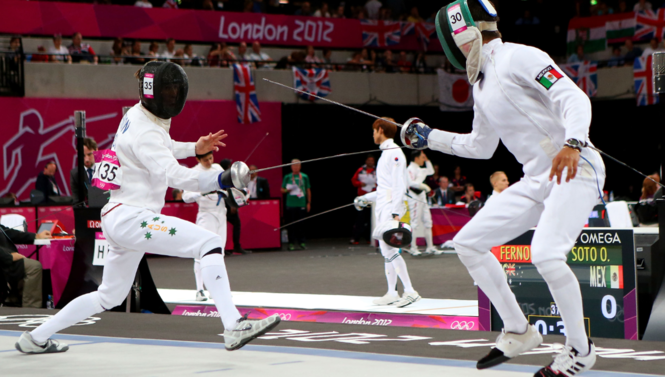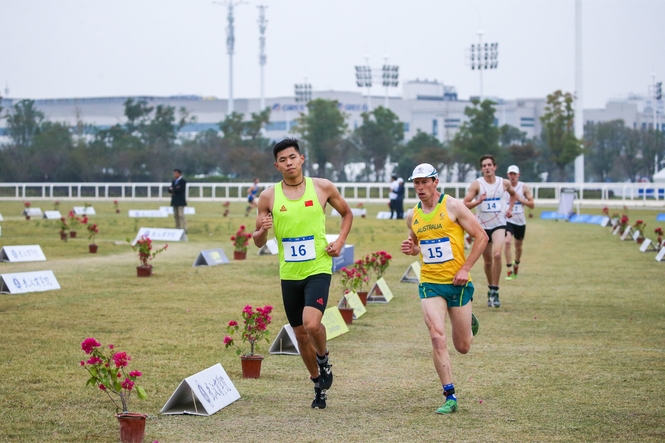Road to Tokyo: Ed Fernon (AUS) back on Olympic stage after epic endurance adventures
Ed Fernon’s Modern Pentathlon career appeared to have peaked when he competed at the London 2012 Olympic Games for Australia and finished 27th. Three years later, he retired from competition, clearing the path for the young pretender – Max Esposito (AUS) – to join his sister Chloe on the Olympic stage.
Fast forward to August 2019 and Fernon (AUS), who had proved his remarkable ability as an endurance athlete in the intervening years while growing his own business and a family, was tempted to give his Olympic dream another shot. Within three months he had secured his place at Tokyo 2020.
In the latest #RoadToTokyo interview, the 32-year-old from Sydney takes up the story…
Q: When, and why, did you take up the Modern Pentathlon?
A: I started Modern Pentathlon in 2007 aged 19 with a running and horse riding background. I had never picked up an epee or pistol and I was a terrible swimmer, but I wanted a personal challenge while I was studying at university.
Q: What has been keeping you busy in recent years?
A: I made the tough decision to retire from competition after the UIPM 2015 Pentathlon World Championships in Berlin (GER). I stayed involved in Modern Pentathlon as Vice President of Oceania Modern Pentathlon and as a mentor for younger athletes.
Following retirement, I started a property development business, which now has a number of projects around Sydney. I soon realised that I missed the physical and mental challenge, which I used to get from Modern Pentathlon, and so in January 2016 I decided to climb Mt Aconcagua, the highest mountain in the southern hemisphere. After an arduous climb, I made it to the summit, which was a surreal feeling after months of training and preparation.
In 2017, I was selected to compete in the Mongol Derby, the longest and toughest horse race in the world, where 42 riders compete on 28 semi-wild Mongolian horses over 1000km. I went on to win this race and break the race record.

Q: So how did that lead you back to Modern Pentathlon?
A: In August 2019, I received a phone call from my athletics coach asking me to consider a comeback for the Tokyo Olympic Games. The trials had been set for November so I would only have three months to get myself back into good shape to be able to compete at a level to qualify. I spoke to my wife about it, and she said to go for it. We agreed that at the very least I would get fit again, and so I returned.
Six weeks after my comeback, I won the New Zealand Modern Pentathlon Championships and met the required qualification criteria to earn a position on the Australian team to compete at the trial at the Asia/Oceania Championships and Olympic Qualifier in Wuhan (CHN). It was at this competition I won the Oceania position for Tokyo.
Q: How did it feel when you secured a qualification place for the Tokyo Olympics?
A: I was very grateful to my wife, family and coaches for all their support and proud of the way I was able to rise to the challenge.
Q: Can you remember watching the last Olympic Games in Rio in 2016? What were you thinking?
A: Of course. I have loved watching the Olympic Games as a kid and every Olympic Games except London I would spend the whole time glued to the TV. As I was watching the Modern Pentathlon in Rio I was closely following my good friend Arthur Lanigan-O’Keeffe as well as Max Esposito.

Q: What do you think about the Olympics being postponed until 2021?
A: The postponement was obviously necessary to ensure the health and safety of athletes. It was disappointing not being able to compete in 2020 but on a positive note it also gives me another year to train before competing in 2021.
Q: How have you been keeping up your physical and mental health during the Coronavirus crisis?
A: I purchased a farm a few years ago and when the lockdown started I moved with my family from Sydney to the farm. This was great for my mental health as it took me out of the city where everyone was worried about the crisis. I also purchased a new horse and built an area and shooting range, so it allowed me to keep up my physical training.

Q: What has been the most challenging part?
A: My personal situation is completely different now to when I was training for the 2012 London Olympics. I am now married with two young children, I have my own business and a number of other professional commitments, so time management has been even more crucial to ensure that I have a healthy work/training/life balance.
Q: What motivates you in training?
A: My motivation is to be able to deliver the best performance possible at the Olympic Games and to inspire my kids.
Q: Describe yourself as an athlete in three words.
A: Determined, fearless, disciplined.

Q: Who are your role models in sport, and in life?
A: I have been fortunate to have a number of mentors in sport and business who have guided me along the way. I have found in life that whatever the goal it is likely that someone has done it before you and they are generally happy to provide assistance. I am incredibly grateful to all these amazing people.
Q: What is your ultimate ambition in Modern Pentathlon?
A: My ultimate ambition is to know at the end of the competition in Tokyo – whether I come first or last – that I have achieved to the best of my ability.



